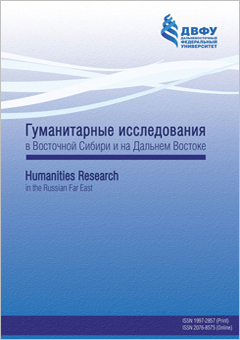Bhāvanā as a principle of Vedic interpretation in Mīmānsā
DOI:
https://doi.org/10.24866/1997-2857/2023-2/76-85Keywords:
Indian philosophy, philosophy of language, Sanskrit, Vedas, Pūrva-Mīmāṁsā, bhāvanāAbstract
Pūrva-mīmāṃsā is one of the six most significant orthodox traditions of Ancient India, dealing with the interpretation of language from a philosophical point of view, in particular, with the issues of interpreting karma-kāṇḍa – the section of the Vedas that pertains to action. Within the framework of these issues, answers are being sought to the questions about the meaning of a sentence, the relationship between language and reality, etc. The concept of bhāvanā («creating energy») plays an important role in resolving these issues. The article is aimed at revealing the semantic structure of this concept and reconstructing the principle of interpretation of the Vedas developed by Mīmāṁsā on its basis. To this end, the author refers to the primary sources in Sanskrit – Mīmāṃsā-sūtra and Śabara-bhāṣya.
Downloads
References
Исаева Н.В. Мокша // Индийская философия: энциклопедия / Под ред. М.Т. Степанянц. М.: Восточная литература; Академический проект; Гаудеамус, 2009. С. 539–541.
Лысенко В.Г. Дискретное и континуальное в истории индийской мысли: лингвистическая традиция и вайшешика: дис. … д. филос. н. М., 1998.
Парибок А.В. Индология. Философия. Лингвистика: избранные статьи и переводы. М.: Садра, 2021.
Пименов А.В. Основные тексты древней пурва-мимансы (формирование, структура, концептуальные установки): дис. … канд. ист. н. М., 1988.
Псху Р.В. Ситуативная герменевтика как историко-философский метод исследования восточных философских текстов: дис. … д. филос. н. М., 2017.
Bilimoria, P., 1988. Śabdapramāṇa: word and knowledge. Dordrecht: Kluwer Academic Publishers.
Bronkhorst, J., 2011. Philosophy of language. In: Jacobsen, K.A., 2011. Brill’s Encyclopedia of Hinduism. Vol. III: Society, religious specialists, religious traditions, philosophy. Leiden: Brill, pp. 672–684.
Gächter, O., 1990. Hermeneutics and language in Pūrva Mīmāmsā: a study in Śābara Bhāsya. Delhi: Motilal Banarsidass.
Kataoka, K., 2001. Scripture, men and heaven: causal structure in Kumarila’s action-theory of bhāvanā. Journal of Indian and Buddhist Studies, Vol. 49, no. 2, pp. 10–13.
Keith, A.B., 1921. The Karma-Mīmāṃsā. London: Oxford University Press.
McCrea, L., 2000. The hierarchical organization of language in Mīmāmsā interpretive theory. Journal of Indian Philosophy, Vol. 28, no. 5/6, pp. 429–459.
Monier-Williams, M.A., 1899. A Sanskrit-English dictionary. Etymologically and Philologically Arranged. Delhi: Motilal Banarsidass.
Ollett, A., 2013. What is «Bhāvanā»? Journal of Indian Philosophy, Vol. 41, no. 3, pp. 221–262.
Potter, K.H. ed., 2014. Encyclopedia of Indian philosophies. Vol. XVI. Philosophy of Pūrva-Mīmāṃsā. Delhi: Motilal Banarsidass.
Shabara-Bhaṣya: in 3 vols. Vol. I. Baroda: Oriental Institute.
The Aphorisms of the Mimamsa by Jaimini. Vol. I. Calcutta: Ganesa Press, 1873.
The Mīmāṃsā Sutras of Jaimini. Allahabad: The Panini Office, 1923.
The Mīmāṅsā Nyāya Prakāśa; or, Āpadevī: a treatise on the Mīmāṇsā system by Āpadeva. New Haven: Yale University Press, 1929.
Downloads
Published
Issue
Section
License
Copyright (c) 2023 Humanitarian research in the Eastern Siberia and the Far East

This work is licensed under a Creative Commons Attribution-NonCommercial-NoDerivatives 4.0 International License.














